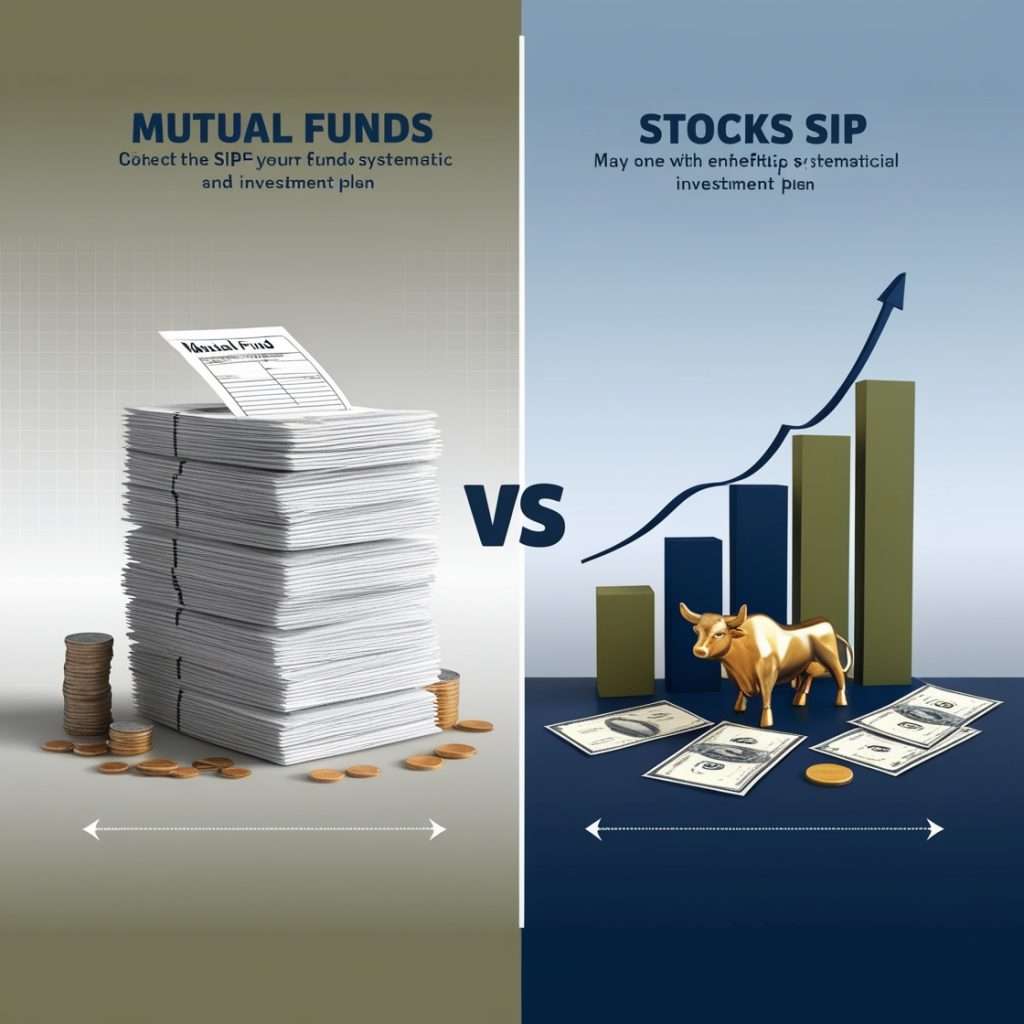In today’s fast-paced world, many people are looking for ways to grow their savings steadily and reliably. Systematic Investment Plans (SIPs) have gained popularity as a disciplined way to invest regularly, whether in mutual funds or directly in stocks. But the big question remains: which is better for you — a Mutual Funds SIP or a Stocks SIP?
Let’s dive into what each option offers and explore which might be the right choice for your financial goals and risk tolerance.

Understanding SIPs: Mutual Funds vs. Stocks
Mutual Funds SIP
When you invest in a Mutual Funds SIP, you’re essentially putting money into a pool that is managed by financial experts. Mutual funds spread your investment across a range of assets, which could include equities, bonds, or other securities. You choose a specific type of mutual fund based on your risk preference—like equity funds, debt funds, or balanced funds.
Advantages of Mutual Funds SIP:
- Diversification: Your money is spread across various assets, reducing the impact of poor performance in any single stock.
- Professional Management: Fund managers with expertise handle the investment, which can be ideal if you lack time or knowledge to track the stock market closely.
- Lower Risk Compared to Direct Stocks: Mutual funds aim to balance risk, especially with diversified portfolios or balanced funds.
- Flexibility: Mutual fund SIPs allow you to choose different types of funds based on your goals, from aggressive equity funds to stable debt funds.
Stocks SIP
A Stocks SIP involves investing directly in specific stocks. Here, you commit to buying shares of a particular company or set of companies at regular intervals. Unlike mutual funds, a Stocks SIP does not include professional fund management—you’re in the driver’s seat, deciding which stocks to invest in.
Advantages of Stocks SIP:
- Higher Potential Returns: Direct stocks can potentially yield higher returns if you pick the right companies, as you are directly exposed to market growth.
- Full Control: You choose the stocks, so if you have strong market insights or preferences, a Stocks SIP allows you to leverage that knowledge.
- Cost Efficiency: You avoid mutual fund management fees, which can help maximize returns in a successful stock strategy.
Comparing the Two: Which One Should You Choose?
1. Risk Tolerance
- Mutual Funds SIP: Generally less risky because of the diversification factor. By spreading investments across various assets, mutual funds help cushion the impact of any single asset’s poor performance.
- Stocks SIP: Involves higher risk, as investing directly in stocks is exposed to the ups and downs of the stock market without a diversified safety net.
Best for: If you’re risk-averse, prefer Mutual Funds SIP; if you’re comfortable with high risk and have confidence in your stock-picking skills, consider Stocks SIP.
2. Knowledge and Time Commitment
- Mutual Funds SIP: Ideal for beginners or those who lack the time to track stock market trends. Professional fund managers make investment decisions on your behalf.
- Stocks SIP: Suitable for those with a good understanding of the stock market or those willing to put in the time to research individual stocks and market trends.
Best for: Busy professionals and beginners may find Mutual Funds SIP easier, while more experienced investors may prefer Stocks SIP for greater involvement.
3. Cost of Investment
- Mutual Funds SIP: Comes with expense ratios (management fees) and potentially exit load fees, which can slightly reduce your returns.
- Stocks SIP: No management fees, but you’ll need to cover brokerage costs for each transaction.
Best for: If you’re looking for low ongoing costs, Stocks SIP might be more cost-effective, though it comes with added responsibility.
4. Potential Returns
- Mutual Funds SIP: Returns depend on the type of mutual fund. Equity funds typically offer higher returns over time but are influenced by market fluctuations.
- Stocks SIP: Potential for high returns if you choose the right stocks. However, the risk of loss is equally high with poor stock choices.
Best for: If you’re seeking high returns and can handle the volatility, Stocks SIP offers this potential; if you prefer more stable returns, Mutual Funds SIP might be better.
Tax Implications
Both mutual funds and stocks in India come with tax benefits for long-term capital gains but differ slightly:
- Mutual Funds: Equity mutual funds held for over a year have long-term capital gains tax benefits (tax-free up to ₹1 lakh annually).
- Stocks SIP: Stocks held for more than one year also benefit from long-term capital gains tax, with similar tax-free benefits up to ₹1 lakh per year.
Which Option Wins?
There’s no one-size-fits-all answer. If you’re new to investing, prefer stability, or don’t have much time to monitor your portfolio, a Mutual Funds SIP might be the better choice. It offers a balanced approach with professional management and reduced risk. On the other hand, if you’re comfortable with market analysis, seek higher potential returns, and have a higher risk tolerance, a Stocks SIP could be a rewarding path.
Quick Recap
| Criteria | Mutual Funds SIP | Stocks SIP |
|---|---|---|
| Risk | Lower risk, diversified | Higher risk, market-dependent |
| Management | Professionally managed | Self-managed |
| Knowledge Requirement | Beginner-friendly | Requires market knowledge |
| Potential Returns | Moderate, consistent | High, with higher risk |
| Costs | Includes management fees | Only brokerage fees |
Final Thoughts
Both Mutual Funds SIP and Stocks SIP have their unique benefits, and the right choice depends on your investment goals, risk tolerance, and time availability. Many investors even choose to blend the two: a Mutual Funds SIP for stability and a Stocks SIP for higher potential returns. Remember, the key to successful investing lies in consistency, long-term planning, and regularly reviewing your portfolio to ensure it aligns with your evolving financial goals.